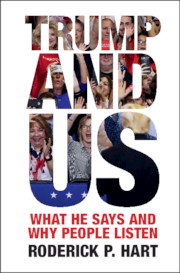Book contents
- Trump and Us
- Communication, Society and Politics
- Trump and Us
- Copyright page
- Dedication
- Contents
- Figures
- Tables
- Acknowledgments
- Part I Feeling Conflicted
- Part II Feeling Ignored
- Part III Feeling Trapped
- Part IV Feeling Besieged
- Part V Feeling Tired
- 8 Trump’s Novelty
- 9 Trump’s Spontaneity
- Part VI Feeling Resolute
- Index
- Communication, Society and Politics
8 - Trump’s Novelty
from Part V - Feeling Tired
Published online by Cambridge University Press: 24 February 2020
- Trump and Us
- Communication, Society and Politics
- Trump and Us
- Copyright page
- Dedication
- Contents
- Figures
- Tables
- Acknowledgments
- Part I Feeling Conflicted
- Part II Feeling Ignored
- Part III Feeling Trapped
- Part IV Feeling Besieged
- Part V Feeling Tired
- 8 Trump’s Novelty
- 9 Trump’s Spontaneity
- Part VI Feeling Resolute
- Index
- Communication, Society and Politics
Summary
Well after it ended, the 2016 presidential campaign remained enigmatic. What parallel universe could explain how Donald John Trump became the nation’s forty-fifth chief executive? How could an experienced, supremely capable woman like Hillary Rodham Clinton be defeated? The punditocracy sputtered for a while after the final votes were tabulated but its explanations soon poured forth: The Daily Wire’s Aaron Bandler offered “Seven Reasons Trump Won,” only to be outdone by CNN’s Gregory Krieg’s “Twenty-Four Theories” for the election’s outcome. The BBC’s Anthony Zurcher proved a piker, only able to adduce “Five Reasons Donald Trump Won” and was further embarrassed by Howard Gold’s “Five Huge Reasons Donald Trump Won.”1 Still, Zurcher won the rhetorical war by declaring that Trump “had built a throne of skulls out of his Republican primary opponents.”2
- Type
- Chapter
- Information
- Trump and UsWhat He Says and Why People Listen, pp. 167 - 195Publisher: Cambridge University PressPrint publication year: 2020

